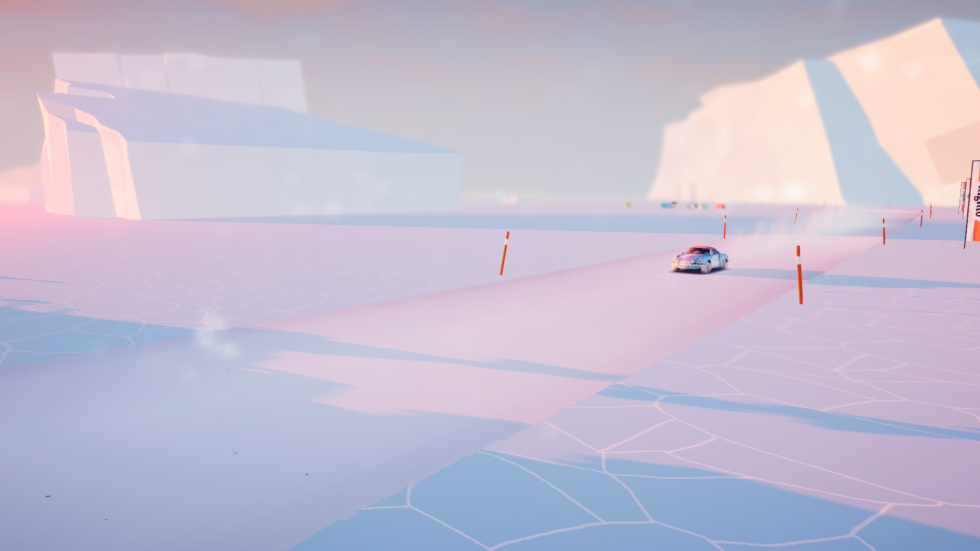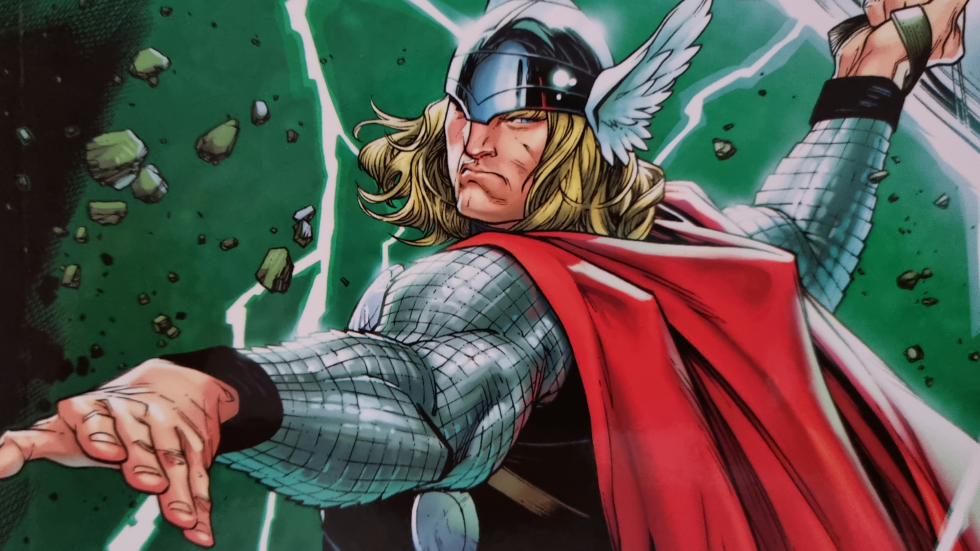Art of Rally | The Adventure Zone: Balance, "The Crystal Kingdom" | The Definitive Thor Redux
- DB
- Sep 3, 2021
- 7 min read
Speeding, shining, thundering.

GAME REVIEW /// Art of Rally
Game summary: Experience the golden era of rally in Career mode, travelling across 60 stages from Finland to Sardinia, Norway, Japan and Germany. (Art of Rally official site)
A little background: Art of Rally is made by the creator of Absolute Drift, which I didn't know until I looked into the background of the game before writing this review and the issues I have with this game suddenly making sense as they're very similar to the previous one. In effect, consider this a partial 'co-review' of Absolute Drift: Zen Edition (the version I played, that is as far from 'zen' as you can imagine).
First things first, this game looks pretty great. Yes, it's simplified compared to a lot of other modern racing titles, but I appreciate that the art style is at least consistent throughout and manages to effectively communicate everything the player needs from a visual standpoint. The lighting especially is stunning and it's very easy to get some great screenshots when the sun is low in the sky.
The sound is pretty basic though, with Art of Rally having a similar problem to Sky Rogue of not feeling substantial enough to be the noise generated by these cars slamming through the various environments. It does sap the atmosphere somewhat when you put your foot down in almost any of the cars and the engines seem to only whine rather than roar.
However, the biggest issue in this game (and Absolute Drift) is the handling, which just doesn't work as well as it feels like it should. Firstly, there's the initial period of adaption that comes from a highly-stylised game that's bright and cheery, suggesting that you're in for a fun, casual experience of slinging cars round corners and kicking up dirt, dust and snow like you see in a lot of rally footage.
Well, that's not the case. Art of Rally is definitely not an arcade racer, but neither is it a more simulation-type racer either, falling in-between the two styles. It's simultaneously more forgiving than most sims and more punishing than most arcade racers, giving off a strange feeling that leaves you wondering how best to play it. It's not intuitive at all, which isn't helped by the biggest problem...
The speedometer is broken, but the physics seem linked to what it says, rather than how fast your car is moving on-screen. Each time there was a new 'generation' of cars to get to grips with, it was frustrating because of how useless the speedo proves to be - you can slow to barely-moving at all as you swing round a tight hairpin and have the game tell you the car is apparently doing 40mph, which it certainly isn't.
It was with the third new set of cars that I eventually lost my patience at having to start learning how to control the game all over again, recovering from spins of collisions with the car clearly moving on-screen at at slower than walking pace yet the speedo saying it was moving much faster and the in-game physics reacting to that displayed speed rather than actual speed.
I have to admit that, as someone who didn't work on Art of Rally, that I don't know if the physics system used in this game is actually linked to the display speed or not, but it would explain some of the bizarre behaviours of every car I tried out. The car's movement and display speed certainly have no relationship though, unless humans really can walk ten times faster than I thought possible.
As you should do in most driving games, it's obviously better to avoid spins or hitting objects, but at least cars in those other games tend to behave pretty much as you'd expect - which can happen when you're learning how each game plays. It's the random nature of the physics here that seem completely unrelated to how fast your car is moving that threw me off.
I did play Art of Rally through Gamepass on the Xbox Series S, so I can't really advise on value for money, but I did get hours and hours of enjoyment out of it before it finally broke me, so I don't want to be too hard on it. Once you find a car or style of driving that works for you, there's a hell of a lot of fun to be had speeding through the various locations and there's no pressure either.
That lack of pressure was a very pleasant surprise for me, which ensure I stuck with the game for longer than I imagine I would've otherwise done. All you have to do to get to the next race is finish the one you're on - it's easy to lose track of how long you've been playing because it's entirely up to you how hard you want to be on yourself. The game just wants to let you drive.
Art of Rally is great fun for a while, but the issues aren't quite small enough to overlook and build up to frustration eventually. It looks fun enough - the lighting is especially gorgeous, but occupies that awkward halfway-house between sim and arcade racer, falling into neither camp and being worse off because of it. You can get hours of enjoyment out of it, but it will slowly wear you down and eventually drive you away.
[6/10 - Decent]
PODCAST REVIEW /// The Adventure Zone: Balance, "The Crystal Kingdom"

Story summary: A new adventure begins! Join our heroes as they host a relatively successful office holiday party, and mourn as that party gets totally side-lined by a potential apocalypse. (The Adventure Zone)
The Tres Horny Boys head off on another adventure to retrieve a Grand Relic, although the stakes are a little higher this time, with the entire world at stake - although that's barely even acknowledged. In most stories, that would be considered an oversight, but it's par for the course here and totally fitting for the three main characters to not worry about that particular existential threat.
As the adventure goes, it's pretty much what you'd expect from them at this point, with a lot of humour and teasing (if not outright trolling) each other about decisions made or incredible achievements in combat, of the successful and unsuccessful varieties. There is a slight tweak to the formula here though that might put some off, and not just "The Crystal Kingdom", but the entire 'Balance' arc going forward.
This is the first truly lore-heavy adventure, with Griffin really setting things up and providing a lot of world-building to flesh things out for future instalments. For first time listeners, it shouldn't be an issue, but repeat listens are somewhat marred by realising how much of what we learn in this story is more important for the future than the present.
The reason this could put some off is that "The Crystal Kingdom" is where The Adventure Zone begins its transition from a game being played with Griffin desperately trying to keep things on track, to a more co-operative form of story-telling. This change isn't necessarily a bad thing, but there already feels like there's less opportunities for events to go off the rails than there were before.
It's part of the reason why I won't be reviewing any of the subsequent stories (and haven't even listened to the current and previous adventures), because the podcast did become way too focused on telling a story than playing a game and the randomness that came with the latter. Don't get me wrong, the McElroys are more than funny enough on their own, but having to react to something unexpected just upped the funny exponentially.
Still, that's the future and not too much the case in this arc - even if it's not quite as funny as what's come before, it's still funnier than most sitcoms or comedy films can manage. The exposition and world-building is pretty interesting too, although isn't quite as satisfying as it could've been because a lot of it is set-up that won't be paid off in this arc. But it really, really pays off big time in the future, so is absolutely worth taking onboard.
"The Crystal Kingdom" is a very enjoyable piece of the bigger puzzle, although it must come with a warning that the style of the podcast is changing more game-playing to story-telling. The latter isn't too overpowering just yet, but it's still pretty clear where things are headed - although it remains as much fun getting there as you'd expect with this bunch, even if the biggest laugh comes from a rather unfortunate name...
[8/10 - Very Good]
COMICS REVIEW /// Marvel Platinum: The Definitive Thor Redux

Summary: Explores more of the Thunder God's greatest adventures and battles with his own rogues' gallery of epic proportions! (Amazon)
From what I can tell, Marvel put out these various Platinum/Definitive/Redux compilations to fit with the releases of major movies in order to either draw new readers in, provide those who like the movies with a little extra background material, or simply concentrate stories about the characters featured in a single place for comic book fans to save them rooting around their own collections for individual issues.
The Definitive Thor Redux is a pretty blatant tie-in to the release of Thor: Ragnarok, so this collection is filled with stories based around Thor, Loki, Hela and Thor's clashes with the Hulk. There's a pretty wide array of stories included too, going back decades and decades, so it's pretty fun to see how these characters changed over time, both in-universe and in how they are portrayed.
However, it should be noted that the MCU versions of these characters are pretty different, especially when it comes to the dialogue and that might put a lot of people off - Thor never comes close to acting like the Chris Hemsworth interpretation, as the primary example. It's not that the dialogue's bad - even if it's definitely melodramatic - but the difference might be just too much.
Another problem with the dialogue actually comes from the more recent version, but has nothing to do with the writing and more to do with the choice of font. To heighten the difference between Asgardian and regular speech, the various gods have a stylised font that can just be a little tricky to read at time when there's a lot of dialogue in one go - I'd definitely advise to not read the later entries when tired.
The last 'problem' is that everything featured here is so epic in scale, that it all feels a little... redundant? Because it's only certain pieces of a story selected to be included, the reader is left without the context of both the build-up and the aftermath. It ends up creating a disconnect here because there are no lulls or slower moments to pace things a little better.
I'd definitely suggest parcelling out The Definitive Thor Redux into smaller chunks, rather than reading multiple stories back-to-back, just to give the material a chance to breathe and sink in. The stories collected here aren't really suited to binge-reading and doing do would lessen the impact of what are some truly brilliant moments featured.
Marvel Platinum: The Definitive Thor Redux is a pretty good collection of stories that people who enjoyed Thor: Ragnarok might enjoy, although the differences between the big-screen and comic book versions of the various characters may put some off - the faux-Shakespearian dialogue in particular.











Comments